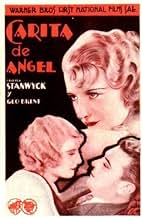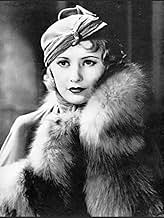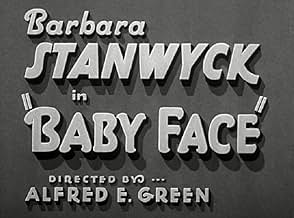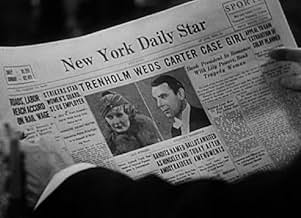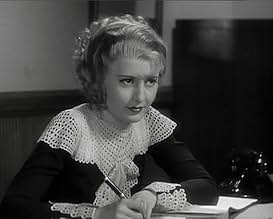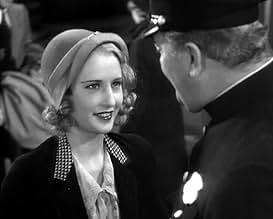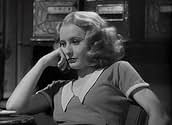Une jeune femme, exploitée sexuellement toute sa vie, décide de renverser la situation et d'exploiter les hommes d'une grande banque de la ville en couchant allègrement avec eux pour accéder... Tout lireUne jeune femme, exploitée sexuellement toute sa vie, décide de renverser la situation et d'exploiter les hommes d'une grande banque de la ville en couchant allègrement avec eux pour accéder aux échelons supérieurs.Une jeune femme, exploitée sexuellement toute sa vie, décide de renverser la situation et d'exploiter les hommes d'une grande banque de la ville en couchant allègrement avec eux pour accéder aux échelons supérieurs.
- Réalisation
- Scénario
- Casting principal
- Récompenses
- 2 victoires au total
- Brody
- (as Douglas Dumbrille)
- Job Seeker
- (non crédité)
- Foward
- (non crédité)
- Paris Bank Clerk
- (non crédité)
- Hodges
- (non crédité)
- Speakeasy Waiter
- (non crédité)
- Speakeasy Customer
- (non crédité)
- Paris Bank Agent
- (non crédité)
Avis à la une
Although this movie should be regarded exclusively in itself, there is ONE comparison that inevitably comes to mind - to the OTHER great pre-Code movie that had been released just two months before "Baby Face", and constituted the other half of the gravestone that Will Hays would soon put on this kind of 'unacceptably immoral' movies: Mae West's "I'm No Angel"... In fact, the philosophy of the two starring ladies is just about the same; only that Mae expressed it in her own, casual way of 'Find 'em, fool 'em, and forget 'em', while Barbara goes by the philosophical advice of none other than Nietzsche: 'Face life as you find it - defiantly and unafraid. Waste no energy yearning for the moon. Crush out all sentiment.' And so she does - she uses her female assets to make a VERY quick career at a big bank, making it to the 'executive suite' in literally no time; she uses the way that Mae West had suggested in words and humorous double-entendres, but VERY explicitly and unequivocally for the whole audience. And she gives a MAGNIFICENT performance (maybe the best one of her whole, great career) as the tough gal determined to do EVERYTHING in order to reach the 'top' - and yet, just when she thinks she's got everything she wanted (everything measurable in dollars, jewels and fur coats, that is), her sentiment, that she'd been trying so hard to crush, sets in, and her 'success story' becomes a drama...
And that's exactly the difference between "Baby Face" and "I'm No Angel": Mae West, as always, takes even her most spicy adventures with humor, always staying on top of things and getting what she wants; while Barbara Stanwyck is forced by the circumstances almost from the beginning of her life to become a 'bad girl' - and that was obviously a TOO much realistic view of things for the Hays Office: while "I'm No Angel" finally got its seal, "Baby Face" was withdrawn from release and edited until it was 'fit' for distribution. But it was still HIGHLY explosive stuff, and soon afterwards the final curtain came down on those daring, 'outrageous' pre-Code movies in the shape of Will Hays' 'Bible' called the Production Code, which would from now on be rigorously applied to EVERY movie before it would be granted a seal.
So enjoy "Baby Face" as one of the most audacious pre-Code films - and as one of the VERY best movies of classic Hollywood in general, featuring one of the GREATEST performances of one of the GREATEST actresses of all times!
This is starkly displayed in Baby Face which was a pre code film and it is more frank in its use of sex as a means of getting what you want.
Lily Powers (Barbara Stanwyck) has been pimped out by her father since she was 14 year of age. Her father runs an illegal drinking den in Pittsburgh. Most of the patrons want to get an eyeful and feel of Lily.
When her father is killed, an elderly friend tells Lily to take a leaf out of the writings of Friedrich Nietzsche and go for greater things even if she has to use men. Lily and her afro american friend Chico (Theresa Haris) hop on a freight train for New York.
When they arrive in the big metropolis, Lily uses her feminine charms to get a job in a bank and go up the corporate ladder by sleeping her way to the top. This leads to tragedy when one of her suitors commits a murder and then kills himself.
The film with its frankness feels like a breath of fresh air. It actually looks modern. Stanwyck is alluring, there is a small early role for John Wayne, one of Lily's amorous victims. The film is unusual with Lily being close to a black character. Watching the restored version was like viewing a lost classic.
After her father dies, one older father type who knows what she's been through and truly cares about her future advises her to go to the big city and take advantage of opportunities there - and not the easy ones - and to take the high road in life. (Note that I saw the censored version and not the uncut - this part of the film was redone for the censors.)
She and Chico (Harris) go to New York where Lily (nickname: Baby Face) decides the low road's a lot smoother and will get her where she wants to go a lot faster. In the movie's most famous scene, the camera moves us up the corporate ladder by taking us from floor to floor as Lily sleeps her way to the top. She finally corrals the big man himself and is able to quit her day job. Trouble follows, and she's soon involved in a huge scandal.
Stanwyck wears lots of makeup and for most of the film is cool as a cucumber as she seduces one man after another with no regrets, and she's great at playing the innocent victim. In one scene, she sits staring at a king's ransom in jewels while wearing a black dress that looks like it's decorated with diamonds at the top. Then she asks Chico for another case, and that's filled with more jewelry, plus securities. All in a day's work.
Theresa Harris was an interesting talent - she could be played down or glamorous, and was a talented singer and dancer as well. Here, she sings or hums the movie's theme, "St. Louis Woman" throughout. She worked in literally dozens of movies and is very good here as a friend of Stanwyck's, her best work being in the precode era. As a bizarre byproduct of the code, blacks were often given less to do in films after it was put in place.
Precode films could be more sexually blatant and therefore, though they're 70+ years old, seem more modern. Even though these films didn't have to have moral endings, Baby Face learns her lessons - how like life it is after all. There were several endings of this film, all with the same message. The one I saw had an added scene, but apparently, there were two other endings that didn't pass the censors. (There wasn't a code but there were always censors.) At any rate, it's a neat surprise. "Baby Face" is an important film in movie history - a must see.
Le saviez-vous
- AnecdotesIn 2004, when Michael Mashon, a curator of the motion picture division at the Library of Congress, received a request for a print of this film, he discovered two negatives of the film: the original camera negative and a "duplicate negative" that was longer. The duplicate negative was the pre-release (uncensored) version of the film that was submitted to the New York State censorship board in 1933 for approval. The uncensored version received its public premiere at the London Film Festival in November 2004, more than 70 years after it was made. The existence of these negatives allows pristine quality prints to be made as compared to other surviving films of that era.
- GaffesWhen Lily reads from Nietzsche's book, Thoughts Out Of Season, the page that's highlighted repeats the same paragraph above, and again below, the highlighted lines.
- Citations
Nick Powers: You little tramp, you!
Lily Powers: Yeah, I'm a tramp, and who's to blame? My Father. A swell start you gave me. Ever since I was fourteen, what's it been? Nothing but men! Dirty rotten men! And you're lower than any of them. I'll hate you as long as I live!
- Versions alternativesThe original release had to be cut by four minutes to pass inspection by the New York Board of Censors. The cuts were mostly very minor, but the most notable were the scene where Lily admits that she began working as a prostitute when she was fourteen and the scene in the boxcar with the yardman, the closeup of the hand turning out the light. These scenes were cut before the film's release in 1933 and were not seen publicly until 2004.
- ConnexionsFeatured in The Love Goddesses (1965)
- Bandes originalesBaby Face
(1926) (uncredited)
Music by Harry Akst
Played during the opening credits
Played as background music often
Reprised on a phonograph record
Meilleurs choix
- How long is Baby Face?Alimenté par Alexa
Détails
Box-office
- Budget
- 187 000 $US (estimé)
- Durée1 heure 11 minutes
- Couleur
- Mixage
- Rapport de forme
- 1.37 : 1



